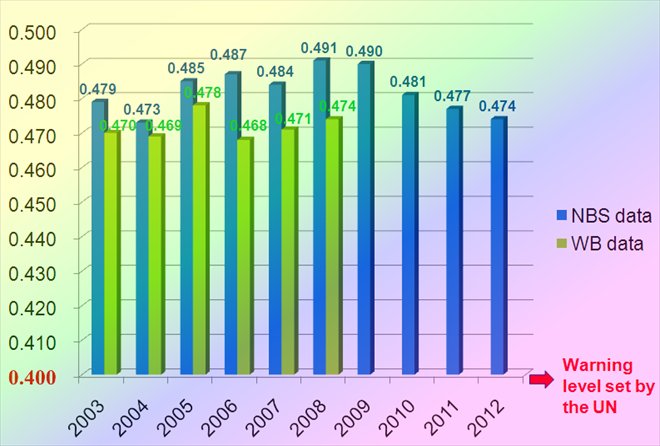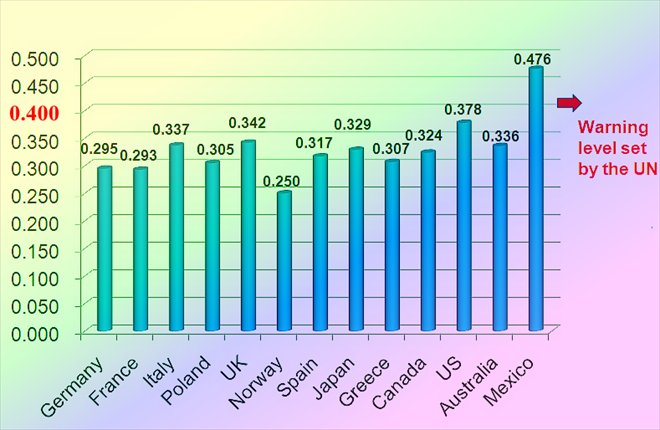HOME >> BUSINESS, TWO SESSIONS 2013
China's inequality index highlights urgency for distribution reforms
Source:Globaltimes.cn Published: 2013-1-20 17:10:00
| Editor's Note |
China's first release of a rich-poor index for the past decade paints a far-from-rosy picture of what the country needs to do to bridge the wealth gap and make more people included in its magnificent growth story.
For the first time in 12 years, China published its official Gini coefficient, a gauge of the wealth gap, calculated between 2003 and 2012. It showed the income gap reached a decade-high of 0.491 in 2008, before declining gradually year-on-year to 0.474 in 2012, according to the National Bureau of Statistics (NBS) Friday.
| Latest News |
Xinhua, Jan. 20, 2013:Inequality index highlights urgency for distribution reforms
Besides the unfair distribution of education, employment and public services amid the country's urbanization initiatives, rent-seeking corruption has become a major culprit behind the yawning gap.
Global Times, Jan. 19, 2013:China’s ‘above warning level’ income gap shows inequality
China's income gap has narrowed since peaking in 2008 but still lingers above the internationally recognized warning level, data from the National Bureau of Statistics (NBS) showed Friday.
Xinhua, Jan. 18, 2013:China Gini coefficient at 0.474 in 2012
An index reflecting the gap between rich and poor reached 0.474 in China in 2012, higher than the warning level of 0.4 set by the United Nations.
| Data |
The Gini coefficient is an index measuring inequality of income with a scale of zero to one (zero being totally equal and one being totally unequal).
A Gini index between 0.3 and 0.4 signals a relatively reasonable income gap, according to UN standards.
China's Gini coefficients in the past decade were all above the warning level of 0.4 set by the UN.
1. China's Gini coefficient

Illustration: Globaltimes.cn
The Gini coefficient has stayed at a relatively high level of between 0.47 and 0.49 during the past decade, indicating the urgency for policymakers to accelerate income distribution reform to narrow the gap between rich and poor, said Ma Jiantang, director of the NBS.
Ma Jiantang, director of the NBS:
"The country should better manage income distribution and strive to make the earnings of low- and middle-income residents grow faster."
Gan Li, a professor with the Chengdu-based Southwestern University of Finance and Economics:
"The central government can address income inequality by increasing fiscal transfers to low-income groups, such as allocating every year's newly added fiscal income and State-owned enterprises' post-tax profits to the low-income earners."
2. Grassroots data:
The publication of the official Gini coefficient has raised some suspicions, as previous research from private or foreign institutions showed that China's wealth inequality is more serious.
According to a research published by the Chengdu-based Southwestern University of Finance and Economics last month, China's Gini coefficient reached 0.61 in 2010, far higher than the NBS' calculation of 0.481 for the year.
Xu Xiaonian, a professor with China Europe International Business School, said on his Sina Weibo account on January 16:
"The official Gini coefficient is less credible than a fairy tale."
Gan Li, a professor with the Chengdu-based Southwestern University of Finance and Economics, told the Global Times on January 16:
"It shows progress that government agencies have released their own calculation of the Gini coefficient, but we hope the NBS can publish more information, such as the original data and methodology."
Ma Jiantang, director of the NBS:
"Gini coefficient data released by grass-roots institutions, as long as they are conducted by rigorous research, is an important addition to the official data."
3. Gini coefficient of other nations in late 2000s

Illustration: Globaltimes.cn
| Media Comments |
The Beijing News commented that reforms should be carried out as soon as possible so all people can share in the profits of development.
China should strengthen its social security system in the short term and invest more in education in the long term to adjust income distribution, according to the Southern Metropolis Daily.
| Related Reports |
GDP growth in 2012 encouraging
New Gini figures show instability risks, need for reform
Hu's call for social equity crucial for China's future
Widening wealth gap in rural China nears warning level
Inclusive growth, inequality are key concerns in emerging Asia
Posted in: Business, Economy, GT Exclusive